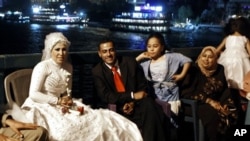In the Middle East, marriage can be expensive - too expensive, in fact, for many young people to afford. While political upheaval spreads across the region, Egyptians say the financial freedom that would allow them to marry is part of the very definition of the democracy they are hoping to build.
A week and a half after the resignation of Egyptian President Hosni Mubarak, cars decorated with lace again appear frequently on the streets of Cairo. In residential neighborhoods, booming music and bright lights of wedding celebrations keep young people dancing long into the night. Egyptian weddings - the cornerstone of the nation’s social world - are back.
But a few blocks away from the party, some young men say they want to get married, but can't. They blame the former Hosni Mubarak government for keeping them financially incapable of marriage. They say as long as they have been alive, financial advancement has depended entirely on connections. Without those connections, many young men work ten years or more, just to have enough money to get married.
During the 18-days of protests that lead to Mr. Mubarak's resignation, chants of "We want to get married," were heard along with more familiar calls to dissolve the government.
Twenty-eight-year-old Tamer Sayz says when he was in college, he met the girl of his dreams. Without the money to buy an apartment, furniture, gold jewels and other things needed before an Egyptian man can propose, he didn’t even bother asking her father permission to wed.
"She knows my soul, you know? I know her soul and she knows my soul," said Tamer.
The girl eventually married someone else, and Tamer says, if he had the money, he would find someone and marry as soon as possible.
But like young people in countries like Yemen, Jordan and Libya, he says opportunities in his country have been squashed by corruption and nepotism. Communications recently made public by WikiLeaks reveal that U.S. diplomats identified delayed marriage as a source of discontent in Libya two years ago. Other scholars have called the problem a regional "marriage crisis," born out of low incomes, and the high cost of marriage. They point out that in conservative Middle Eastern countries, unmarried young adults are generally denied intimate relationships, and the social status that comes along with being an adult.
Mahmoud, a 25-year-old financial analyst, says a middle-class Egyptian man needs to save 13 times his annual salary before he can marry. He calls this an injustice, and says that a system that allows young people to make enough money to get married in their 20s is an essential part of the democracy he hopes Egypt will soon build.
"All of the youth, they are waiting to be 30 to get married," said Mahmoud. "He works for 9 years to have sufficient money to get married. The average age of the youth is high. I think it makes people not happy."
The World Bank says more than 50 percent of the Arab world’s population is under 30 years old, and high unemployment is rampant across the region. In Yemen, the region’s poorest country, young men complain that marriage is too expensive for recent college graduates contending with a 35 percent unemployment rate.
In Egypt, many young people say they are hopeful that a new, democratic, government will bring social and economic justice, making marriage more accessible. But if the new government is not democratic, and does not create economic opportunities for the youth, they say, they are fully prepared to rise up again.
'Delayed' Marriage Frustrates Middle East Youth





